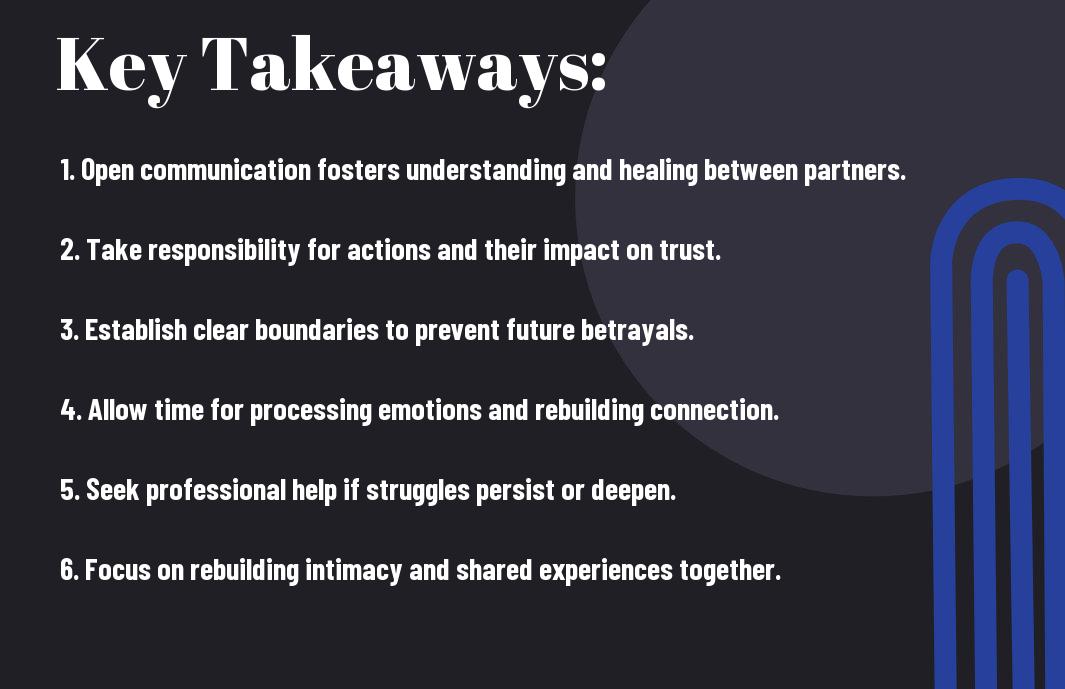Just because an affair has shattered your relationship doesn’t mean all hope is lost. You can launch on the journey of rebuilding trust with the right approach. This process requires you to be committed, patient, and open to honest communication. In this blog post, you’ll discover ten necessary tips that will help you navigate this challenging path and create a stronger, more resilient bond with your partner. Get ready to take proactive steps toward healing and restoring the faith that has been disrupted.
Key Takeaways:
- Open and honest communication is vital for both partners to express their feelings and concerns.
- Establishing boundaries helps rebuild a sense of safety and security within the relationship.
- Understanding the reasons behind the affair can provide insights and prevent future issues.
- Therapy or counseling can offer professional guidance and support in navigating the healing process.
- Patience is key, as rebuilding trust takes time and consistent effort from both partners.
- Forgiveness is a necessary step, but it should come naturally and not be forced.
- Focus on rebuilding shared goals and activities to strengthen the bond between partners.


Understanding the Impact of Infidelity
The aftermath of an affair can leave lasting scars on both partners involved. Infidelity can fundamentally alter the dynamics of your relationship, challenging trust and safety. It’s imperative to recognize how the betrayal affects not only your partner but also yourself. Understanding these impacts can guide you on the path toward healing and rebuilding trust.
Emotional Consequences for the Betrayed Partner
Impact from the betrayal often manifests as feelings of anger, confusion, and deep sadness. Your partner may question their self-worth and grapple with overwhelming feelings of insecurity. It’s common for them to experience trust issues moving forward, complicating any attempt to rebuild the relationship.
Psychological Effects on the Betrayer
Below the surface, the betrayer may face significant psychological ramifications. Feelings of guilt, shame, and anxiety can become overwhelming as they navigate the consequences of their actions and the emotional fallout for both partners. Addressing these feelings is imperative for personal growth and the potential reconciliation of the relationship.
This journey involves not only confronting feelings of guilt but also processing emotional turmoil stemming from the affair. It is crucial for you to engage in self-reflection to understand why you acted as you did. This awareness can lead to positive behavioral changes and improvements in your emotional well-being. Engaging in therapy or support groups can provide a space to process these feelings constructively and help you forge a healthier path forward.
Importance of Open Communication
If you want to rebuild trust after an affair, open communication is vital. It allows both partners to express their feelings honestly and understand each other’s perspectives. This process is about creating a safe environment where sharing is encouraged, which is critical for healing. For more insights, check out 10 Common Marriage Reconciliation Mistakes to Avoid After Infidelity.
Creating a Safe Space for Dialogue
By fostering an atmosphere where both partners feel secure, you create a foundation for genuine dialogue. This means incorporating active listening, validating emotions, and refraining from judgment, which enables both of you to share deeply held feelings without fear of backlash.
Active Listening Techniques
At the heart of effective communication are active listening techniques. You should not only hear your partner’s words but also truly understand their feelings and intentions behind them. This is about reflecting back what they say and asking clarifying questions to deepen the conversation. Additionally, minimizing distractions and maintaining eye contact shows your commitment to the dialogue.
Dialogue involves turning communication into a collaborative process. As you practice these techniques, you will discover that validating your partner’s emotions can foster greater intimacy and trust. When you actively listen, it demonstrates that their feelings matter, creating an environment where both of you can openly express aspirations and fears. By using these strategies, you can ensure that communication becomes a positive tool in your relationship’s healing journey.
Establishing Transparency
Your journey toward rebuilding trust requires a commitment to transparency. This means opening up every aspect of your life to your partner, making it easier for both of you to heal and grow together. By fostering an environment of honesty and openness, you demonstrate to your partner that you are serious about rebuilding the relationship, allowing them to feel more secure in their connection with you.
Sharing Passwords and Access
For many couples, sharing passwords and access to personal accounts can serve as a powerful step in creating transparency. This commitment shows your willingness to break down barriers, allowing your partner to feel more secure in your relationship, while empowering them to monitor your activities if they choose. Open communication about privacy expectations is vital, as it creates a mutual understanding and fosters trust between both partners.
Being Open About Daily Activities
Around your everyday life, it’s important to be honest about your daily activities. Keeping your partner in the loop helps them feel included and valued, while also reducing the potential for misunderstandings. Sharing details about your whereabouts, who you spend time with, and your plans helps to build confidence in your commitment to the relationship. By actively engaging and being forthcoming, you create a foundation of trust that can aid in the healing process.
With transparency comes the responsibility to share not just your activities, but also your feelings and intentions behind them. When you are open about your plans, including who you’ll be with and what you’ll be doing, it encourages your partner to voice any concerns or insecurities without fear. This kind of openness helps to align your values while creating a stronger bond. In addition, by being receptive to your partner’s feelings and actively working to address them, you contribute to a supportive environment where trust can flourish. This partnership builds the foundation necessary for a resilient relationship moving forward.
Setting Boundaries and Expectations
Keep in mind that establishing clear boundaries and expectations is crucial for rebuilding trust after an affair. You and your partner must openly communicate about what behaviors are acceptable and what are not. This transparency helps create a safe space where both of you can navigate the healing process and work towards reconstruction without repeating past mistakes.
Defining Relationship Guidelines
About redefining your relationship guidelines: this entails discussing what each of you expects from one another moving forward. You must both articulate your needs and desires while considering each other’s feelings. These guidelines should include emotional, physical, and social boundaries that promote a healthier dynamic between you and your partner.
Discussing Future Commitments
On the topic of future commitments, it’s crucial to discuss what you both envision for your relationship. This conversation should include expectations regarding fidelity, emotional availability, and shared goals. Being honest about your commitment levels can significantly impact the healing process and help you both build a positive future together.
Future commitments involve aligning your aspirations and ensuring that you are both on the same page. This means openly talking about your hopes for the future, including family plans, financial matters, and long-term dreams. By defining these elements together, you create a solid foundation for rebuilding trust. Being transparent about your goals and listening to your partner’s needs fosters a partnership rooted in mutual respect, which is crucial for overcoming the past and moving forward together.

Seeking Professional Help
Many couples find that overcoming the aftermath of an affair can be a daunting task, and seeking professional help can provide the guidance necessary for healing. A therapist can create a safe space for both partners to express their feelings, address underlying issues, and work toward rebuilding trust. Therapy offers a structured environment where you can learn effective communication skills and strategies to navigate this challenging period together.
When to Consider Therapy
Around the onset of significant emotional distress or unresolved conflict, it becomes evident that professional intervention may be beneficial. If you notice persistent feelings of resentment, anger, or sadness, or if you struggle to communicate openly with your partner, it might be time to seek therapy. Early intervention can prevent further damage, providing both partners with the tools needed to move forward.
Benefits of Couples Counseling
Professional couples counseling offers numerous advantages as you work through the aftermath of an affair. Even in the most strained relationships, skilled therapists can facilitate communication, allowing you to express your thoughts and feelings without fear of judgment. Through guided sessions, you and your partner can explore underlying issues, improve emotional connection, and develop a mutual understanding, which is pivotal in the healing process. Furthermore, accessing a professional can help both of you establish effective coping strategies and set realistic expectations for rebuilding your relationship.
Rebuilding Intimacy
To effectively rebuild intimacy after an affair, it’s vital to prioritize open communication and vulnerability with your partner. This process demands time and patience, as both of you navigate the complexities of trust and emotional connection. Take small steps to reconnect and engage in activities that foster closeness, enhancing your bond as a couple.
Physical Connection and Affection
For many couples, the physical aspect of intimacy is key to re-establishing trust. Start by incorporating simple gestures like holding hands, cuddling, or gentle touches into your daily routine. These small acts can help rebuild comfort and affection, gradually leading to deeper physical connection as you both heal.
Emotional Intimacy and Trust
Intimacy goes beyond the physical; it involves sharing your thoughts, feelings, and vulnerabilities with each other. This emotional connection is foundational for rebuilding trust, as it encourages honesty and transparency. Take time to discuss your feelings openly and support one another, creating a safe environment for expressing your true selves.
Also, as you work on emotional intimacy, pay attention to building trust through genuine actions that reinforce your commitment to each other. Make an effort to show appreciation for each other’s feelings and actively listen, validating one another’s experiences. Avoiding defensiveness and instead approaching conversations with empathy will pave the way for a stronger bond. Be mindful of, trust is built over time, so be patient and consistent in your efforts to synchronize your emotional worlds.
Conclusion
Summing up, rebuilding trust after an affair requires commitment and effort from both partners. By implementing the 10 must-know tips outlined, you can create a foundation for healing and restore the connection in your relationship. Being open, honest, and patient with yourself and your partner is key as you navigate this challenging journey. It’s important to communicate effectively and actively address any lingering feelings to foster understanding and intimacy. With time and dedication, you have the potential to rebuild a stronger, more resilient bond.
FAQ
Q: What are the first steps to take after discovering an affair?
A: The initial steps involve open and honest communication between partners. It’s vital to express feelings and concerns without placing blame initially. Setting aside time for a calm discussion allows both partners to share their thoughts and emotions. This is also an opportunity to decide if the relationship is worth saving and to outline possible next steps for rebuilding trust.
Q: How important is transparency in the process of rebuilding trust?
A: Transparency plays a foundational role in the rebuilding process. The partner who had the affair should be willing to share details about the incident, including why it happened and how they plan to prevent it from occurring again. This openness can help reassure the hurt partner and foster a safer space for healing and understanding.
Q: Can couples therapy be beneficial in rebuilding trust after an affair?
A: Yes, couples therapy can be a significant asset in rebuilding trust. A trained therapist can provide a neutral space for both partners to express their feelings and guide them through the complexities of their emotions. Therapy can equip both partners with effective communication strategies and coping mechanisms that support emotional healing and reconnection.
Q: How long does it typically take to rebuild trust after an affair?
A: The timeline for rebuilding trust can vary greatly from couple to couple. It depends on factors such as the depth of the hurt partner’s feelings, the sincerity of the unfaithful partner’s actions, and the commitment both partners have to the healing process. It is often a gradual journey that can take months or even years, making patience and consistent efforts important.
Q: What are some strategies to foster healing and restore intimacy after an affair?
A: Restoring intimacy requires both physical and emotional efforts. Engaging in activities that promote bonding, such as date nights, meaningful conversations, and shared hobbies, can help rekindle connection. Additionally, establishing new boundaries and reaffirming commitments in the relationship can foster a sense of safety and support, important for healing.
